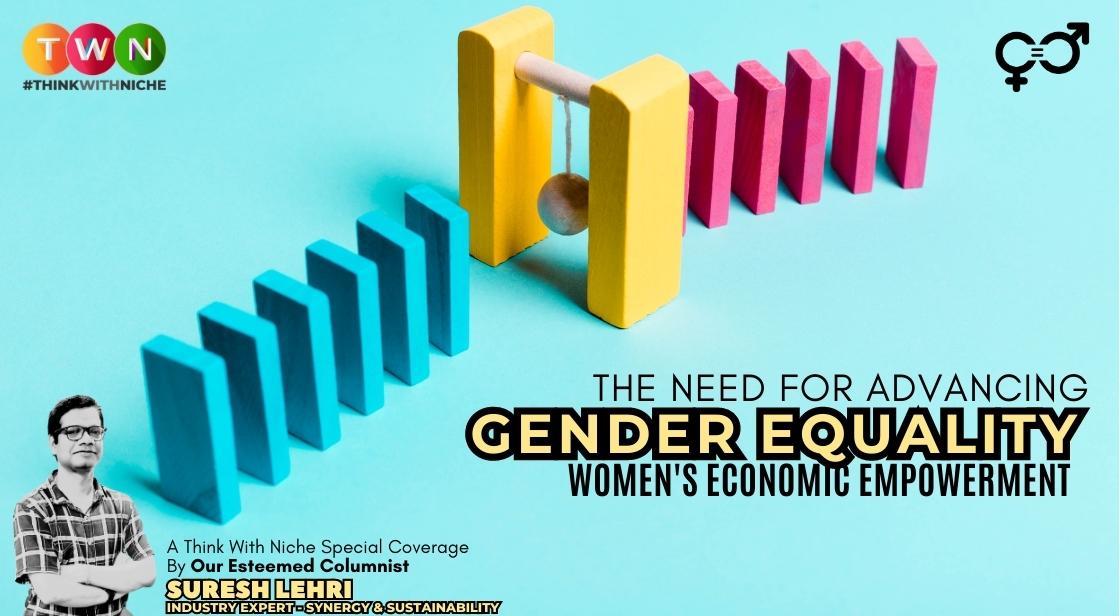The Need for Advancing Gender Equality and Women's Economic Empowerment

Blog Post
As we march towards a more equitable future, let us not forget the immense potential that lies untapped in women's economic empowerment. It's time to unlock this potential, and in doing so, we unlock a world of prosperity for all.
Let's continue to strive for equality, not for the sake of a single group, but for the prosperity and well-being of everyone. Together, we can build a world where every individual, regardless of gender, has the opportunity to thrive.
Imagine a world where every woman is empowered economically, where gender balance isn't a distant dream but an everyday reality. A world where women’s innovative ideas, untiring will, and indomitable spirit are harnessed to their full potential. This is not just a utopian desire, but an imperative we need to strive for, today and every day.
The quest for gender equality and women's economic empowerment has never been more critical.
If we are to foster sustainable development and shared prosperity, it is paramount that we break down the barriers hindering women’s economic participation.
But why, you might ask, should we lay such emphasis on gender equality? The answer lies in the transformative potential of women's economic empowerment.
Consider the untapped reservoir of talent, creativity, and innovation that exists in women across the globe. Imagine the potential economic growth if this talent is put to productive use.
It's not just about justice or fairness, but about driving progress, fostering innovation, and fuelging economic growth.
- When women thrive, societies thrive.
- When women are economically empowered, poverty moves a step back.
- And when women are given the same opportunities as men, the world becomes a more equitable place.
Join us in this compelling exploration as we delve deep into the essence of gender equality and women's economic empowerment.
Imagine a world where every individual is given an equal opportunity. Where gender doesn't dictate your socio-economic standing. Where women are rightfully acknowledged for their contributions and capabilities, empowered to reach their full potential. This is the world we ought to work towards.
"Empowering women isn't just the right thing to do—it's the smart thing to do." - Barack Obama
Gender equality isn't a women's issue alone. It's an economic imperative that concerns us all. It's about creating a society where everyone, regardless of their gender, can thrive.
Yet, despite significant strides, gender disparities continue to persist in the economic sphere. From wage gaps, occupational segregation, to the underrepresentation of women in leadership roles - the obstacles are multifaceted and deeply ingrained.
It's high time we challenge these norms. It's high time we go beyond just acknowledging the problem to taking robust, targeted actions that promote gender equity and women's economic empowerment.
Join us as we delve deeper into this crucial topic, exploring the transformative potential of breaking down barriers and fostering equal opportunities. Because promoting gender equality isn't just about justice—it's the key to sustainable development and prosperity for all.
"Women earn on average 23% less than men globally."
The Need for Advancing Gender Equality and Women's Economic Empowerment
Breaking Down Barriers to Women's Economic Empowerment
Traditionally seen as the weaker sex, women have long been sidelined when it comes to economic participation. However, as we venture further into the 21st century, it's becoming increasingly clear that this outdated mindset needs to be overhauled. Breaking down the barriers to women's economic empowerment is not just a matter of justice, but also a matter of economic common sense.
The first barrier is the stereotype that women are less capable than men. This stereotype fosters an environment where women are less likely to be hired for certain positions, less likely to be promoted, and more likely to be paid less than their male counterparts. It's a cycle of inequality that's stifling women's economic potential.
Another barrier is the lack of access to quality education and training for women. Without the right skills and knowledge, women are unable to compete in today's ever-changing job market. It's a barrier that keeps many women trapped in low-paying, unstable jobs.
Finally, the burden of unpaid care work falls disproportionately on women. This includes tasks like child care, elder care, and housework, which often go unrecognized and unrewarded. The time and energy spent on these tasks often leaves women with little opportunity to participate in the formal economy.
With these barriers in place, it's clear that we have a long way to go in achieving women's economic empowerment. But by acknowledging these barriers and working to break them down, we can begin to pave the way towards a more equitable future.
"Women are more likely to work in low-paying sectors and informal jobs."
Also Read: Stop Human Disturbance to Save Earth's Freshwater
The Transformative Potential of Gender Equality
The transformative potential of gender equality is not just a lofty ideal, it's a proven catalyst for economic growth and prosperity. It's the key to unlocking a world where everyone, irrespective of their gender, has the chance to thrive and contribute to society's progress. A world where women's economic empowerment is not an exception, but the rule.
How, you might ask? Let's delve into this fascinating universe.
Breaking Down Barriers
Women face numerous obstacles in the economic sphere, be it societal norms, discriminatory laws, or lack of access to resources and opportunities. By breaking down these barriers, we are not only bringing justice to half of the world's population, but also boosting our global economy. It's a win-win!
Creating Equal Opportunities
Imagine a world where women have equal access to education, healthcare, and job opportunities. A world where they're provided the same chances as men to showcase their skills and talents. This not only boosts their individual self-esteem and economic status but also fuels economic growth on a broader scale.
Unlocking Untapped Potential
Women are powerhouses of untapped potential. When we remove barriers and create equal opportunities, we allow this potential to flourish and contribute to the economy. The benefits, from increased productivity to innovation, are myriad.
So, we see, promoting gender equality is not merely a matter of justice—it's an economic imperative. It’s a vital step towards sustainable development, prosperity, and a more balanced world.
The Economic Impact of Advancing Women's Rights
world where every woman has the right to economic security, the power to make decisions, and the ability to shape policies. Sounds empowering, right? That's the transformative potential of gender equality.
When women thrive, economies flourish. A McKinsey Global Institute report found that achieving gender equality could add a staggering $12 trillion to global GDP by 2025. But, what's the catch?
Despite the clear economic benefits, we're far from making this vision a reality. It's a disparity that costs us all. The World Economic Forum estimates that at the current rate, it would take almost a century to close the global gender gap.
"Women perform 66% of the world's work, produce 50% of the food, but earn only 10% of the income and own 1% of the property."
Unlocking Women's Economic Potential
It's more than fairness; it's about untying the economic potential of half of the world's population. Economies that prioritize women's economic empowerment are more competitive and dynamic. But how do we get there?
Break the Barriers: From discriminatory laws to social norms and gender stereotypes, we need to address and dismantle these barriers.
Equal Opportunities: Access to quality education, decent work, and representation in political and economic decision-making processes are vital.
Support Women Entrepreneurs: Provide access to capital, networks, and mentorship to help women start and grow their businesses.
"Closing the gender gap in labor force participation could boost global GDP by $28 trillion by 2025."
Equality is Prosperity
The equation is simple: When women can fully participate in the economy, everyone benefits. It's about economic growth, poverty reduction, and fostering a more just, equitable world.
It's time to recognize that gender equality is not just a fundamental human right but a necessary foundation for a peaceful, prosperous, and sustainable world.
So, let's change the narrative. Let's create an inclusive, equitable world where everyone, regardless of gender, has the opportunity to thrive. It's time for action. It's time to advance gender equality and women's economic empowerment.
"Women's labor force participation rate is 63%, compared to 94% for men._
The Connection between Gender Equality and Sustainable Development
Let's kick things off by spotlighting a profound truth: gender equality isn't simply about fairness - it's a key ingredient in the recipe for sustainable development. It's a link so strong that it's impossible to ignore, yet so subtle that it often goes unnoticed. The connection between gender equality and sustainable development is like the string that holds a pearl necklace together - invisible, yet vital.
Think about it. If we exclude or limit the potential of half the population, how can we possibly hope to achieve comprehensive, sustainable development? It's like trying to run a marathon with one leg - not only implausible but also unjust.
Recognizing and embracing the economic power of women isn't just about giving women a fair shake. It's about shaking up the whole system for the better. By empowering women, we're not merely leveling the playing field - we're raising the bar for everyone.
"Gender equality is more than a goal in itself. It is a precondition for meeting the challenge of reducing poverty, promoting sustainable development and building good governance." - Kofi Annan
Still not convinced? Let's take a look at some numbers.
According to the World Economic Forum, it will take another 108 years to achieve gender parity. Shocking, right? Additionally, McKinsey Global Institute states that if women played an identical role in labor markets to that of men, as much as $28 trillion could be added to the global annual GDP by 2025. That's the size of the economies of the United States and China combined!
Also Read: Contributions Of The World's Richest People To Fight Climate Change
The Way Forward: Strategies for Promoting Women's Economic Empowerment
woman has the tools to thrive economically - a world where women's ideas, talent, and hard work are equally valued. That world is within our reach, and here's how we can get there.
Education and Skill Development:
Education is a fundamental pillar for women's economic empowerment. Access to quality education equips women with knowledge and skills necessary to participate actively in the workforce and seize economic opportunities. According to a report by the World Bank, every additional year of schooling for women leads to an increase in their earnings by an average of 10-20%. Additionally, studies have shown that investing in girls' education has positive effects on a country's GDP and reduces poverty.
Real-Life Example: The "Educate Girls" initiative in India works to increase girls' enrollment and retention in schools. By employing community-based volunteers and innovative teaching methods, the program has helped more than 750,000 girls access education, leading to improved economic prospects for the entire community.
-
According to the World Bank, girls who complete secondary education are more likely to be employed, earn higher wages, and have smaller families.
-
A study by the International Labour Organization found that women who receive training in entrepreneurship are more likely to start their own businesses and create jobs.
-
In India, the Self-Employed Women's Association (SEWA) has helped millions of women gain access to education and training, and has helped them start their own businesses.
Changing Societal Attitudes:
Deep-rooted gender norms and stereotypes often hinder women's economic progress. Addressing these attitudes is crucial for achieving gender equality in the workforce. Initiatives that promote gender sensitivity training, challenge harmful beliefs, and encourage shared household responsibilities can lead to greater female workforce participation and economic empowerment.
Real-Life Example: The "HeForShe" campaign, led by UN Women, encourages men and boys to join the fight for gender equality. By involving men as allies, the campaign challenges traditional gender norms and fosters an inclusive environment for women to thrive in all sectors.
-
A study by the World Economic Forum found that gender discrimination costs the global economy $16 trillion each year.
-
In many countries, women still face discrimination in the workplace, in the home, and in society at large.
-
The #MeToo movement has helped to raise awareness of gender discrimination, and has led to some important changes in attitudes and policies.
Enabling Policy Environments:
Gender-responsive policies are vital for creating an environment where women can fully participate in the economy. This includes measures to ensure equal pay for equal work, parental leave policies, and protection against workplace discrimination. According to the International Labour Organization (ILO), closing the gender pay gap could add $2.5 trillion to the global economy.
"Women perform 75% of the world's unpaid care work."
Real-Life Example: Iceland, known for its commitment to gender equality, became the first country to enforce a law mandating equal pay for men and women in 2018. By implementing this law, Iceland sets an example for other nations to follow suit in reducing gender-based wage disparities.
-
The United Nations Sustainable Development Goal 5 calls for gender equality and the empowerment of all women and girls.
-
Many countries have adopted gender-responsive policies, but more needs to be done to ensure that these policies are implemented effectively.
-
In India, the government has launched a number of initiatives to promote women's economic empowerment, including the Pradhan Mantri Kaushal Vikas Yojana (PMKVY), which provides training to women in high-demand skills.
Financial Access and Inclusion:
Women's access to financial services and resources is critical for their economic empowerment. However, women are often excluded from formal banking systems, limiting their ability to save, invest, and start businesses. Providing tailored financial products and services to women, such as microloans and savings accounts, can have a significant impact on their economic independence.
Real-Life Example: Kenya's M-Pesa mobile money service has been instrumental in promoting financial inclusion for women. By providing a secure and accessible way to save and transfer money, M-Pesa has empowered countless women to engage in economic activities and improve their livelihoods.
-
According to the World Bank, 1.7 billion adults around the world do not have access to a bank account.
-
Women are more likely than men to be excluded from the formal financial system.
-
Microfinance has helped to expand financial access for women, but more needs to be done to reach the most marginalized women.
-
In Kenya, the M-PESA mobile money platform has made it possible for millions of women to access financial services.
Support for Entrepreneurship:
Entrepreneurship offers women opportunities to create and grow their businesses, but they face unique challenges in accessing funding and mentorship. Creating programs that offer financial support, training, and networking opportunities can help women overcome these barriers and thrive as entrepreneurs.
Real-Life Example: The Cherie Blair Foundation for Women provides mentorship and skills training to women entrepreneurs in developing countries. Through their programs, women have increased their business income, created jobs for their communities, and contributed to local economic growth.
-
Women entrepreneurs face a number of challenges, including access to capital, mentorship, and networking opportunities.
-
There are a number of organizations that provide support to women entrepreneurs, such as the Women's World Banking and the International Finance Corporation.
-
In the United States, the Anita Borg Institute provides mentorship and networking opportunities to women in technology.
Here are some real-life examples of how these strategies have been used to promote women's economic empowerment:
-
In India, the Self-Employed Women's Association (SEWA) has helped millions of women gain access to education and training, and has helped them start their own businesses. SEWA has also lobbied the government to adopt policies that support women's economic empowerment.
-
In Kenya, the M-PESA mobile money platform has made it possible for millions of women to access financial services. M-PESA has helped women to save money, start businesses, and pay for school fees.
-
In the United States, the Anita Borg Institute provides mentorship and networking opportunities to women in technology. The Anita Borg Institute has helped to increase the number of women in technology, and has helped to create a more inclusive tech industry.
These are just a few examples of how these strategies can be used to promote women's economic empowerment. By working together, we can create a world where women have the tools they need to thrive economically.
By combining these strategies with real-life examples and up-to-date data, we can foster a more logical and evidence-based approach to promoting women's economic empowerment. By investing in education, challenging societal norms, implementing inclusive policies, improving financial access, and supporting women entrepreneurs, we can move closer to a world where women's economic potential is fully realized, benefiting not only women but society as a whole.
"Only 22% of parliamentarians globally are women."
Challenges and Opportunities in Achieving Gender Equality
Gender equality remains an elusive dream for many societies worldwide. In our pursuit for balance, we encounter a myriad of challenges, but each hurdle also presents a unique opportunity for growth. Let's explore these complex dynamics, where challenges and opportunities intertwine.
One of the most significant challenges is cultural norms and biases. These age-old, ingrained societal beliefs often discourage women from pursuing economic independence. However, it's important to remember that culture is not static — it evolves, offering an opportunity to reshape these norms and create a more egalitarian society.
Education, or a lack thereof, is another pressing issue. It's a sad truth that many girls still do not receive adequate schooling. Yet, here lies an opportunity in the form of increased investment in girls' education, which can spur economic empowerment and equality.
Workplace discrimination is a barrier that many women face in their careers. But as companies become more aware of the benefits of gender diversity, there's an opportunity to break the glass ceiling and promote equal employment opportunities.
Finally, the unequal distribution of unpaid care work continues to hinder women's economic participation. A shift in societal attitude towards shared responsibilities can provide a solution, helping women dedicate more time to economic activities.
These challenges, daunting as they may seem, are not insurmountable. They demand our attention, action, and a commitment to change. By unmasking these barriers, we can pave the way for true gender equality and women's economic empowerment.
From Small Steps to Giant Leaps: Success Stories of Women's Empowerment
Picture a world where every woman, regardless of her location or background, has the freedom to make her own economic decisions. Can you imagine the massive, positive ripple effects on families, communities, and economies? This is not mere speculation. It's happening right now, and we have proof.
Take the story of Malala Yousafzai, the youngest Nobel Laureate, who used her voice to advocate for girls' education in Pakistan. Malala understood that education is a powerful tool for economic empowerment. Now, she inspires millions of girls worldwide to strive for their education, creating a more equal future.
Another inspiring model is Cherie Blair’s Foundation for Women. This foundation has empowered over 160,000 women from 100 countries through mobile technology. Women who were once victims of economic disparity are now running successful businesses, improving their families' lives, and contributing to their local economies.
In the corporate world, we see Indra Nooyi, the former CEO of PepsiCo, shattering the glass ceiling. Nooyi led one of the world’s leading food and beverage companies, demonstrating that women can thrive in positions traditionally dominated by men.
But it's not just about individual success stories. There are also significant collective efforts. For example, the Self Employed Women's Association (SEWA) in India organizes low-income, self-employed women workers. This association has significantly improved the economic status and self-esteem of over 1.5 million members.
These stories illustrate how small steps towards gender equality and women’s economic empowerment can lead to giant leaps for humankind. They remind us that empowering women is indeed a catalyst for sustainable development and prosperity for all.
Gender inequality costs the global economy an estimated $12 trillion annually.
The Role of Men in Advancing Gender Equality
It's no secret that gender equality is a shared responsibility that transcends gender boundaries. Men, as important actors in society, have a pivotal role to play in this transformative journey. Their participation, support, and advocacy are indispensable in reshaping societal norms and structures that perpetuate gender inequality.
Understanding the Problem
For many, the notion of male involvement in gender equality might seem paradoxical. After all, isn't the social construct of patriarchy essentially a male-dominated system? However, the fact remains that men, too, are often bound by the restraints of gender stereotypes and expectations. Recognizing this is the first step toward fostering a more equitable society.
"Injustice anywhere is a threat to justice everywhere." - Martin Luther King Jr.
The Power of Allyship
Men, as allies, can contribute significantly to the gender equality discourse. By challenging the status quo and advocating for equitable policies and practices, they can help dismantle the societal barriers that inhibit women's economic empowerment. Moreover, their influence can encourage other men to join the movement, creating a powerful ripple effect.
Strategies for Involvement
So, how can men effectively contribute to gender equality? The answer lies in education, introspection, and action. This involves unlearning biased beliefs, empathizing with the experiences of others, and taking concrete steps to promote equality in personal and professional domains.
Education: Gain a deep understanding of gender issues and how they impact society.
Introspection: Reflect on personal biases and prejudices to facilitate personal growth.
Action: Actively advocate for gender equality in every sphere of influence.
With men as active participants in the quest for gender equality, we can accelerate progress toward a world where every individual, regardless of gender, has the opportunity to contribute and thrive economically. Let's strive for equality, not as a women's issue, but as a collective human endeavor.
In conclusion, we firmly believe that advancing gender equality and women's economic empowerment is not a mere act of equity but a necessary strategy for sustainable development and universal prosperity. As we have explored, breaking down barriers, promoting equal opportunities, and tapping into the potential of women in the economy presents a world of transformative prospects.
The Shared Responsibility
Indeed, the responsibility of fostering gender equality extends beyond women, demanding collective action that involves men as supportive companions. This is not simply a 'women's issue,' but a universal human matter that affects us all.
Accelerating the Journey
While we have made significant strides, there is still a long way to go. Every individual can contribute to this journey by advocating for gender equality in their daily lives, workplaces, and broader communities.
You May Like
EDITOR’S CHOICE












